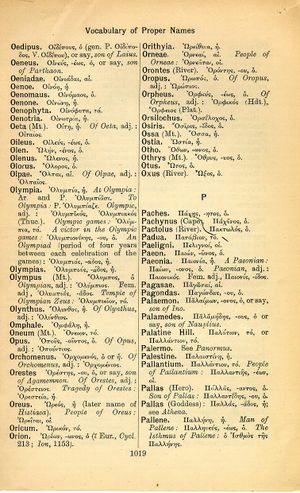Orpheus: Difference between revisions
κρεῖττον τὸ μὴ ζῆν ἐστιν ἢ ζῆν ἀθλίως → death is better than a life of misery, it is better not to live at all than to live in misery
(Names) |
(6_11) |
||
| Line 3: | Line 3: | ||
<b class="b2">Of Orpheus</b>, adj.: Ὀρφικός (Hdt.), Ὄρφειος (Plat.). | <b class="b2">Of Orpheus</b>, adj.: Ὀρφικός (Hdt.), Ὄρφειος (Plat.). | ||
}} | |||
{{Lewis | |||
|lshtext=<b>Orpheus</b>: (dissyl.), i (Gr. dat. Orphei, Verg. E. 4, 57; Gr. acc. Orphĕă, Verg. E. 6, 30; Ov. P. 3, 3, 41:<br /><b>I</b> Orphēā, id. M. 10, 3; voc. Orpheu, Verg. G. 4, 494; Ov. M. 11, 44), m., = [[Ὀρφεύς]]>, the [[famous]] mythic [[singer]] of [[Thrace]], [[son]] of Œagrus and [[Calliope]], and [[husband]] of [[Eurydice]]; [[after]] her [[death]] he led her [[back]] from the Lower World, [[but]] [[lost]] her on [[turning]] to [[look]] at her, breaking his [[promise]] to [[Pluto]]. He [[was]] one of the Argonauts, Hor. C. 1, 12, 8; Ov. M. 10, 3 sq.; 11, 5 sq.; Hyg. Fab. 164; 251; Verg. E. 4, 55; Cic. N. D. 1, 38, 107 et saep.—Hence,<br /> <b>A</b> Or-phēus, a, um, adj., = [[Ὀρφεῖος]]>, of or belonging to [[Orpheus]], Orphean ([[poet]].): vox, Ov. M. 10, 3: [[lyra]], Prop. 1, 3, 42.—<br /> <b>B</b> Or-phĭcus, a, um, adj., = Ὀρφικός, of or belonging to [[Orpheus]], Orphic ([[class]].): [[carmen]], Cic. N. D. 1, 38, 107: sacra Orphica, id. 3, 23, 58: [[versus]], Macr. S. 1, 18, 17.—<br /> <b>C</b> Orphăĭcus, a, um, adj., = Ὀρφαικός, Orphic.—In plur. subst.: Orphăĭci, ōrum, m., the Orphics, the followers of [[Orpheus]], Macr. Somn. Scip. 1, 12. | |||
}} | }} | ||
Revision as of 08:44, 13 August 2017
English > Greek (Woodhouse)
Ὀρφεύς, -έως, ὁ.
Of Orpheus, adj.: Ὀρφικός (Hdt.), Ὄρφειος (Plat.).
Latin > English (Lewis & Short)
Orpheus: (dissyl.), i (Gr. dat. Orphei, Verg. E. 4, 57; Gr. acc. Orphĕă, Verg. E. 6, 30; Ov. P. 3, 3, 41:
I Orphēā, id. M. 10, 3; voc. Orpheu, Verg. G. 4, 494; Ov. M. 11, 44), m., = Ὀρφεύς>, the famous mythic singer of Thrace, son of Œagrus and Calliope, and husband of Eurydice; after her death he led her back from the Lower World, but lost her on turning to look at her, breaking his promise to Pluto. He was one of the Argonauts, Hor. C. 1, 12, 8; Ov. M. 10, 3 sq.; 11, 5 sq.; Hyg. Fab. 164; 251; Verg. E. 4, 55; Cic. N. D. 1, 38, 107 et saep.—Hence,
A Or-phēus, a, um, adj., = Ὀρφεῖος>, of or belonging to Orpheus, Orphean (poet.): vox, Ov. M. 10, 3: lyra, Prop. 1, 3, 42.—
B Or-phĭcus, a, um, adj., = Ὀρφικός, of or belonging to Orpheus, Orphic (class.): carmen, Cic. N. D. 1, 38, 107: sacra Orphica, id. 3, 23, 58: versus, Macr. S. 1, 18, 17.—
C Orphăĭcus, a, um, adj., = Ὀρφαικός, Orphic.—In plur. subst.: Orphăĭci, ōrum, m., the Orphics, the followers of Orpheus, Macr. Somn. Scip. 1, 12.

